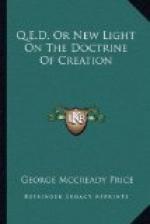The plain and unambiguous teaching of the Bible is that God, the Creator, is a being, a person, infinite in all His powers and perfections, omnipresent throughout the universe; yet that there is a place in which He is to be found, or where He abides, in a sense in which He is not to be found in any other place. This paradox is easily understood when we realize that God is present everywhere throughout His universe by His word and by His Spirit,—His word being as effective throughout the remotest corners of His universe as near at hand, for the very simple reason that matter has no “properties” which He has not imparted to it, and therefore it can have no innate inertia or reluctance to act which God’s word would need to overcome in order to induce it to act, even when this word operates across the boundless fields of space. He has created free personalities, and He leaves the mind of each of His creatures free to serve Him or not to serve Him, these free intelligent beings becoming thus true second causes. More than this, provision for almost innumerable second causes seems to have been made even among other departments of nature, without however interfering with the direct action of the word of the Infinite One in guiding and controlling them all.
Christ Jesus, our Lord and Savior, was associated with the Father in all the primary work of Creation; and He came to earth to show us what God the Father is like, that mortals might behold their Creator without being consumed. In Him we are to behold as much of the Deity as it is for our good to know; beyond that we must trust the hand that never wearies, the mind that never blunders, the heart that never grows cold.
In reality the seeming conflict between the doctrine of second causes and that of God’s omnipresence is closely analogous to the old (imaginary) conflict between the Law and the Gospel, read from the book of nature instead of from the Bible. The reign of second causes is the reign of law; but God’s immediate action brings in the supernatural, the miraculous, or the Gospel. Each has its proper place; and neither must be dwelt on to the exclusion of the other. We are all under the hard exactitude of the law, with its irrevocable condemnation, until the Gospel intervenes, and not only pardons the past, but enables us to fulfil the law’s requirements for the future. The reign of second causes alone would take away man’s moral responsibility, making us all mere creatures of our environment, the victims of a merciless determinism, and death would be the inevitable result of the violation of the slightest physical or physiological law. But we are all given power to live above environment, and a beneficent healing power is constantly intervening to save us from the consequences of our errors, healing our wounds and curing our diseases, in this giving us an object lesson of the forgiveness of sin and a promise of our ultimate conquest over all its power. We are all ineluctably bound about by countless chains of second causes, “awful with inevitable fates,” until we see through them all the close providential working of our Creator, who is also our Saviour, and who is in no way shackled by His own laws, but conducts all things according to the counsel of His own will.




